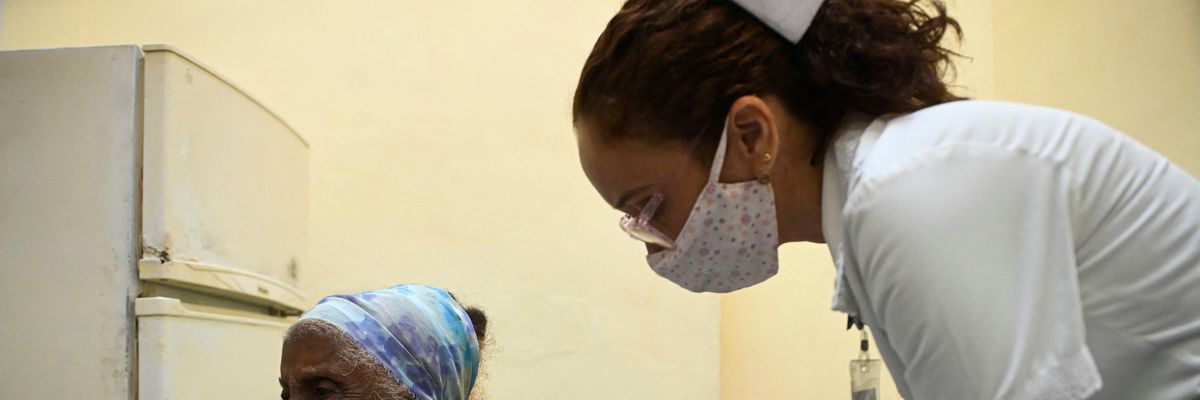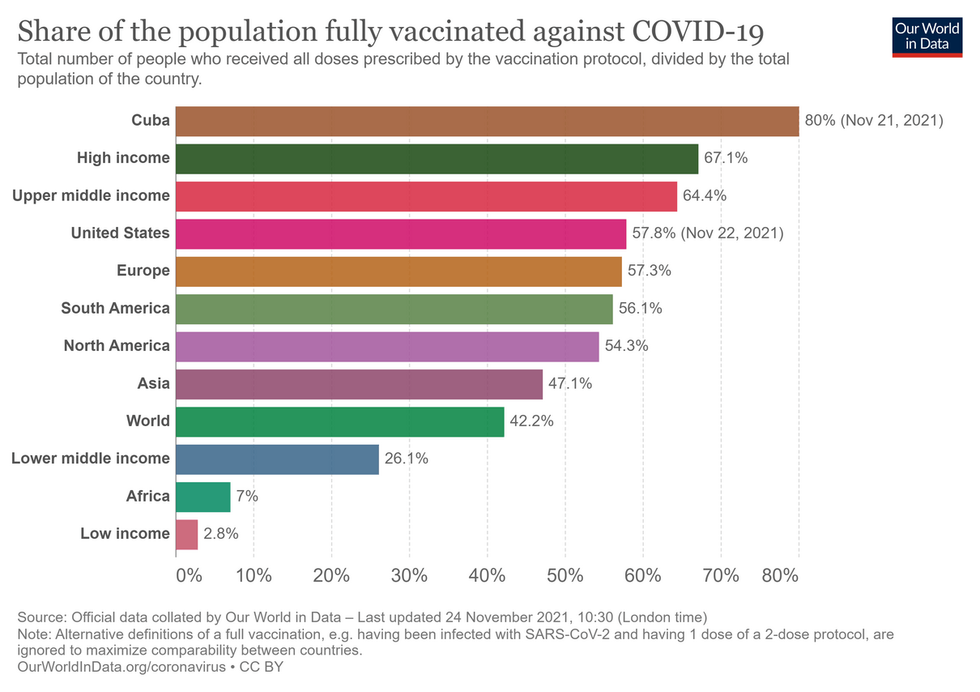Despite the added challenges created by a six decade-long U.S. blockade, Cuba's public biotech sector has developed two highly effective vaccines and its universal healthcare system has inoculated four-fifths of its population.
Additionally, the island has begun exporting its homegrown doses and is on the verge of sharing its recipes with impoverished nations abandoned by Big Pharma and wealthy countries.
"Cuba knew it would be hard to obtain Covid vaccines, so it made its own... and they could be key to vaccinating the world."
"Cuba is now one of the few lower-income countries to have not only vaccinated a majority of its population," Jacobin's Branko Marcetic wrote Tuesday, "but the only one to have done so with a vaccine it developed on its own."
According to Our World in Data, Cuba has fully vaccinated 80% of its population against Covid-19, putting it in the top 10 globally, and well ahead of several wealthy nations. Nearly 90% of Cubans have received at least one dose, again outpacing most of the world--even as the Biden administration has intensified Washington's embargo on the island, stifling its economy and depriving its residents of food and medical supplies, including syringes.
"Cuba," wrote Marcetic, "has been able to do the unthinkable, developing its own vaccine and outdoing much of the developed world in overcoming the pandemic, despite its size and level of wealth, and despite a policy of concerted economic strangulation from a hostile government off its shores."
He added that "international solidarity efforts have been vital, too. When the U.S. blockade meant a shortage of syringes on the island, jeopardizing its vaccination campaign, solidarity groups from the United States alone sent 6 million syringes to Cuba, with the Mexican government sending 800,000 more, and more than 100,000 on top of that coming from Cubans in China."
Since a late-August peak of nearly 10,000 cases and almost 100 deaths per day, Cuba's successful vaccination effort has coincided with a major decline in coronavirus infections and mortality. While Covid-19 has claimed the lives of 8,295 Cubans since the pandemic began, the country recorded zero deaths from the disease on Tuesday.
Moreover, "the country reopened its borders on November 15 to tourism, roughly a tenth of its economy, and has reopened schools," Marcetic noted. "This makes Cuba an outlier among low-income countries, which have vaccinated only 2.8% of their combined populations."
The glaring gap in vaccination rates between rich and poor countries is the result of vaccine hoarding by wealthy governments--which have gobbled up most of the world's doses, occasionally wasting excess supplies even as they tout their insufficient donations--and pharmaceutical corporations' refusal to share vaccine formulas, even though the underlying technology is publicly funded.
While health justice advocates continue to push for a temporary suspension of deadly intellectual property barriers at the World Trade Organization--a widely supported move that would enable qualified manufacturers to produce generic Covid-19 vaccines, treatments, and tests--Big Pharma has lobbied to maintain its extremely profitable monopoly control over lifesaving knowledge, and the industry continues to be backed by the United Kingdom, Germany, and a few other opponents of the patent waiver.
As that struggle continues ahead of the WTO's biannual Ministerial Conference that begins on November 30, Marcetic argued that Cuba's domestic vaccine production "suggests a path forward for the developing world as it continues struggling with the pandemic in the face of ongoing corporate-driven vaccine apartheid, and points more broadly to what's possible when medical science is decoupled from private profit."
Marcetic attributed Cuba's successful inoculation drive to the country's "decision to develop its own vaccines, two of which--Abdala, named for a poem penned by an independence hero, and Soberana 02, Spanish for 'sovereign'--were finally given official regulatory approval in July and August."
He continued:
In the words of Vicente Verez Bencomo, the internationally acclaimed head of the country's Finlay Vaccine Institute, the country was "betting it safe" by waiting longer to manufacture its own vaccines. This way, it would avoid dependence on bigger allies like Russia and China while adding a new commercial export at a time of ongoing economic hardship.
These efforts are already underway. Vietnam, with only 39% of its population fully vaccinated, inked a deal to buy 5 million vaccine doses, with Cuba recently shipping more than 1 million of them to its communist ally, 150,000 of which were donated. Venezuela (32% fully vaccinated) also agreed to buy $12 million worth of the three-dose vaccine and has already started administering it, while Iran (51%) and Nigeria (1.6%) have agreed to partner with the country to develop their own homegrown vaccines. Syria (4.2%) has recently discussed with Cuban officials the prospect of doing the same.
The two vaccines are part of a suite of five Covid vaccines Cuba is developing. That includes a vaccine delivered nasally that's progressed to Phase II of clinical studies, one of only five vaccines in the entire world that have a nasal application, according to one of its top scientists, that could be particularly useful if proven to be safe and effective, given the virus's entry through the nasal cavity. It also includes a booster shot specially designed to work for those already inoculated with other vaccines, and which was recently trialed on Italian tourists. Since September, Cuba's been in the process of getting World Health Organization approval for its vaccines, which would open the door to its widespread adoption.
Unlike the mRNA vaccines produced by Pfizer and Moderna, Cuba opted to develop a more traditional vaccine, as Natureexplained Tuesday:
In developing Soberana 02, Verez Bencomo's group drew on its existing "conjugate" vaccine technology. Finlay's conjugate vaccines take a protein or a sugar from a bacterium or virus and chemically link it to a harmless fragment of a neurotoxin protein from the tetanus bacterium... Conjugate vaccines against meningitis and typhoid are used around the world, and Cuba has been immunizing children with a vaccine of this type for years.
[...]
[The Center for Genetic Engineering and Biotechnology's] Abdala vaccine is also making major strides. As with Soberana 02, the technology behind it is adapted from an existing vaccine--one for hepatitis B--that Cuba developed and has used for many years.
Protein-based vaccines like Soberana 02 and Abdala come with multiple advantages.
For one thing, Marcetic wrote, they "can be kept in a fridge or even at room temperature, as opposed to the subpolar temperatures the Pfizer vaccine has to be stored at or the freezer temperatures Moderna's vaccine requires," making distribution easier, especially in developing countries and remote areas.
"Cuba has decommodified a vital human resource--the exact opposite policy direction that we've seen in these last four decades of neoliberalism."
Alluding to other vaccines' extreme cold storage requirements, Helen Yaffe, senior lecturer in economic and social history at the University of Glasgow, told Marcetic that "in the Global South, where huge amounts of the population have no access to electricity, it's just another technological obstacle."
Moreover, because Cuba has relied on conjugate vaccines for years to protect people, including children, from meningitis and typhoid, Bencomo told Nature he is confident that Soberana 02--which has been used to inoculate nearly two million Cuban children so far--is safe across age groups.
As Marcetic noted, "the mRNA technology, which has never been used on kids before, has meant a lag between adult and child vaccination in the developed world--and means vaccines for kids under five are still being developed."
Cuba, by contrast, "aimed from the outset to create a vaccine that kids could take," he added. "As of this month, it's fully vaccinated more than four-fifths of all kids aged two to eighteen."
Arguably the most important aspect of Cuba's vaccines, proponents say, is that their development demonstrates the existence of an alternative model for scientific research that puts people over profits.
"The Cuban vaccine," Yaffe told Marcetic, "is 100% entirely a product of a public biotech sector."
Marcetic explained:
While in the United States and other developed countries, lifesaving medicines are developed thanks largely to public funding before their profits and distribution are ruthlessly privatized for corporate enrichment, Cuba's biotech sector is wholly publicly owned and funded. That means Cuba has decommodified a vital human resource--the exact opposite policy direction that we've seen in these last four decades of neoliberalism.
Cuba has poured billions of dollars into creating a domestic biotech industry since the 1980s, when a combination of an outbreak of dengue fever and new economic sanctions from then-president Ronald Reagan forced its hand. Despite a crushing blockade by the United States, responsible for a third of the world's pharmaceutical production, Cuba's biotech sector has thrived: it makes nearly 70% of the roughly eight hundred medicines that Cubans consume and eight of the eleven vaccines in the country's national immunization program, and it exports hundreds of millions of vaccines a year. The revenues are then reinvested into the sector.
Journalist Paris Marx marveled at Cuba's recent accomplishment. "Under U.S. embargo for 60 years," they tweeted, "Cuba knew it would be hard to obtain Covid vaccines, so it made its own... and they could be key to vaccinating the world."
"The Cuban vaccine is 100% entirely a product of a public biotech sector."
"Being in Canada, it's such a stark contrast," Marx added. "Canada hasn't even manufactured Covid vaccines, let alone developed them, after privatizing the public pharma company. Meanwhile, Cuba is not only measuring up to the top global pharma giants, it's producing vaccines for export."
Marcetic wrote that "while Cuba's rebound from the pandemic suggests [Bencomo's] and the Cuban government's confidence in the vaccines isn't misplaced, it may take some more time for them to get the international scientific community's official imprimatur."
"Should it come," he continued, "it would prove a powerful refutation of the corporate-driven vaccine model that has so far dominated, which holds that, in line with the talking points of Big Pharma, only profit-driven competition can produce the kind of lifesaving innovation the world is desperate for."
Ongoing opposition to waiving patents threatens to prolong vaccine apartheid and with it, the Covid-19 pandemic--potentially endangering everyone should a vaccine-resistant variant emerge, as epidemiologists have repeatedly warned is a growing possibility.
In light of that, Marcetic added, "we should all hope that Cuba's vaccines are proven as successful as its scientists are sure they are."


